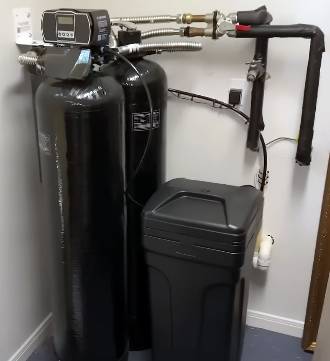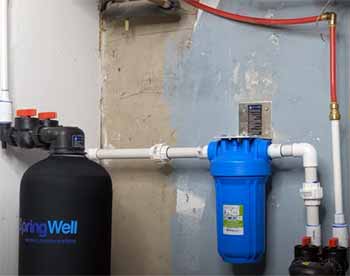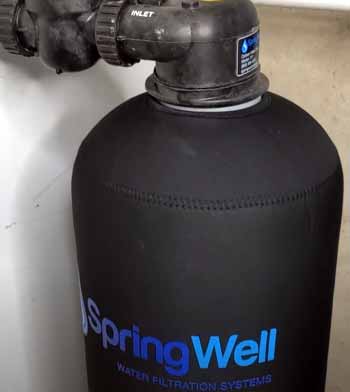If you’re in the market for a water softener and want the best performance per dollar, you should look closely at Aquasure and SpringWell.
I installed both systems in my own home to see which one truly shines—and which one underdelivers.
In this review I compare features, real-world performance, pros and cons, and help you decide which fits your household needs and budget.
Comparison Table: Aquasure Vs. SpringWell
| Feature | Aquasure Harmony (48k/64k grain) | SpringWell SS4 / SS6 Whole House |
| Grain Capacity | 48,000 or 64,000 grains | 64,000 or 96,000 grains |
| Control Head | Digital metered (proprietary brand) | Wi-Fi enabled digital touch pad, advanced metering |
| Installation | DIY-friendly, but manual instructions | Mostly DIY, more polished videos and support |
| NSF Certification | No | NSF/ANSI standards certified for scale and chloramine |
| Warranty | 5-year limited, lifetime US tech support after registration | Lifetime warranty on tank/resin, standard head warranty |
| Water & Salt Efficiency | Efficient metered regen, good salt use | Highly efficient due to smart scheduling and bigger resin |
| Softening Performance | Very good scale control in hard water regions | Excellent scale and chlorine reduction combined |
| Known Issues | Some reports of brine valve leaks | Higher upfront cost, WiFi setup occasional glitches |
| Price Point | Budget-friendly | Premium-priced but feature-rich |
My Experience with Aquasure and SpringWell Water Softeners

I installed Aquasure’s Harmony Series softener first and ran it for several months in a household of four.
It reduced hardness levels from over 10 gpg down to near zero reliably.
Installation was manageable for a DIYer, but I had to watch tutorial videos to avoid misplacing the brine hose elbow.
The digital metering head worked well, and salt usage remained moderate.
Around the sixth month I switched to the SpringWell SS4 system so I could test both side-by-side.
SpringWell’s instruction videos and customer support felt more polished.
The Wi-Fi-equipped digital head allowed scheduling regen to run overnight.
Soft water was immediate and consistent, with excellent scale control and even some reduction in chlorine smell.
After a few months I compared salt consumption: Aquasure required more salt due to smaller resin size and fixed regen thresholds.
SpringWell used less salt and water overall thanks to larger capacity and smarter scheduling.
I also noted my kettle and shower heads had less build-up under SpringWell.
Aquasure felt dependable and offered great value, but SpringWell provided elevated efficiency and monitoring ease.
Installation Experience: Aquasure Vs. SpringWell
When it came to installing these two water softeners, I had distinctly different experiences that might help you decide which one fits your comfort level with DIY projects.
Aquasure’s system came with a straightforward manual and a basic set of tools.
The components were clearly labeled, and I was able to complete the installation in just a few hours without professional help.
However, I will admit I had to watch a couple of YouTube tutorials to better understand how to set the brine valve correctly and make sure the bypass valve was properly configured.
The instructions could be clearer, but overall, the system felt very DIY-friendly. Once installed, setup of the control head was simple, though it lacks any app or remote controls.
On the other hand, SpringWell’s package impressed me with its detailed installation videos and extra hardware like flexible hoses and mounting brackets.
The Wi-Fi-enabled control head required a bit more tech setup, but SpringWell’s customer support was quick to answer my questions during that process.
The overall build quality felt more robust, and the fit-and-finish of the parts made the plumbing connections easier to tighten and less prone to leaks.
If you’re a hands-on person who wants a no-frills, affordable solution and doesn’t mind a bit of learning, Aquasure is solid.
But if you prefer a premium kit with polished instructions and extra tech features—even if that means a slightly longer setup—SpringWell is the winner here.
Maintenance Tips for Water Softener Systems

- Check Salt Levels Monthly: Keep salt above half-full to prevent salt bridging and blockages.
- Clean Brine Tanks Annually: Clear out sludge from the tank interior to maintain performance.
- Sanitize Resin Beds Yearly: Use sanitizer if there’s iron or organic buildup in water.
- Monitor Hardness Regularly: Test softened water every few months. Low values indicate resin working well.
- Schedule Regeneration at Night: Set regeneration cycles during low-usage hours to avoid supply interruption.
- Inspect All Hose Connections: Leak checks at brine lines and bypass valves help prevent flooding.
- Log Salt Refills and Regenerations: Notes help diagnose issues and validate warranty claims.
- Use High-Purity Pellet Salt: Cleaner salt reduces bridging and keeps the system running smoothly.
- Trim Regen Frequency If Needed: Adjust regen interval based on household usage and hardness.
- Keep Pre-Filters Clean: If using sediment or carbon filters upstream, service them on schedule.
Customer Support and Warranty: What You Can Expect
Having reliable customer support and a solid warranty are crucial when investing in a water softener, and both Aquasure and SpringWell deliver—but with some differences worth noting.
Aquasure provides a 5-year limited warranty, which is pretty standard for the price range.
What I found valuable is their lifetime US-based technical support once you register the product.
This means if you hit any issues down the road, you can get help without additional charges, which adds peace of mind for DIY installers.
Their response time is usually within one business day, and support staff are knowledgeable.
SpringWell offers a more comprehensive warranty—typically lifetime coverage on tanks and resin, plus a limited warranty on the control head.
This reflects their confidence in product durability but also matches their premium price.
Their customer service is known for being responsive and helpful, especially when dealing with the more complex Wi-Fi features or plumbing questions.
In my experience, both companies want you to succeed with their products, but SpringWell’s added warranty and support polish fit well with their premium positioning.
Aquasure stands out as a reliable, budget-friendly brand backed by solid US support, ideal if you want savings without sacrificing service.
Pros and Cons of Aquasure and SpringWell

Pros:
- Aquasure offers solid performance for a lower price.
- The digital metering head saves water and salt.
- Lifetime US-based tech support is available after registration.
- SpringWell provides NSF certification, and advanced Wi-Fi controls.
- SpringWell’s larger grain capacity means longer intervals between regen.
- Both systems deliver soft water that improves skin feel and soap performance.
- Aquasure resin comes preloaded, simplifying DIY installation.
- SpringWell’s app and smart features make monitoring easy.
- SpringWell reduces scale and chlorine odor better than Aquasure.
- Aquasure retains competitive value for standard households.
Cons:
- Aquasure instructions can be unclear and require careful reading.
- Some Aquasure units have reported leaks at brine hose connectors.
- Aquasure lacks NSF certification, which may concern some buyers.
- SpringWell is significantly more expensive upfront.
- SpringWell Wi-Fi setup can occasionally cause connectivity issues.
- Aquasure’s smaller tanks mean more frequent salt refills.
- SpringWell’s head replacement would cost more due to proprietary parts.
- Aquasure warranty depends on registration within limited time.
- SpringWell installation may feel overkill for small houses.
- SpringWell tanks are bulkier and require more space.
Also Read: My Thoughts On Morton Water Softener
Aquasure Vs. SpringWell
- Aquasure Vs. SpringWell SS4
Aquasure’s design focuses on practicality and value.
It delivers effective softening and modest salt efficiency for mid-sized households.
SpringWell SS4 ups the game with Wi-Fi controls, chlorine reduction options, and larger capacity.
Aquasure fit well into my DIY budget setup, but once I saw SpringWell’s smart monitoring and extended warranty, I understood the higher price.
If you want simple and effective, Aquasure may suffice.
If you want tech features, certification, and upgrade-ready plumbing, SpringWell excels.
- Aquasure Vs. SpringWell SS6 Stainless Dual-Tank
The SpringWell SS6 stainless steel system includes twin tanks for uninterrupted service during regen.
Aquasure uses a single tank and goes offline briefly during regeneration.
SS6 also includes premium materials resistant to corrosion.
Aquasure can’t compete with nonelectric or uninterrupted service.
However, SS6 costs significantly more, and Aquasure still delivered soft water reliably—with two tanks maybe unnecessary unless you’re running commercial usage or very large family plumbed systems.
- Aquasure Vs SpringWell Salt-Free Conditioners
SpringWell sells salt-free scale conditioners too.
Aquasure offers only salt-based softeners.
If your goal is scale prevention without wastewater or salt, SpringWell salt-free options make sense.
But they don’t remove hardness, so soap performance and lather remain compromised.
Aquasure’s salt-based resin does remove hardness completely—even if it uses more salt.
- Aquasure Vs. SpringWell Iron Removal Add-On
SpringWell offers an iron filter combo alongside the softener.
Aquasure does not package iron removal as a direct add-on.
If your water supply has iron, SpringWell’s iron filter significantly improves taste and prevents rust stains.
That makes SpringWell more versatile for homes on well or mineral-rich municipal supply.
Aquasure can pair with third-party iron filters, but it’s not an integrated solution.
- Aquasure Vs. SpringWell Commercial-Grade Systems
SpringWell provides heavy-duty commercial softeners for high-use settings.
Aquasure caters strictly to residential users.
If you need high flow rates or service to multiple bathrooms and appliances, SpringWell offers commercial-grade equipment.
Aquasure isn’t designed for that load.
But for typical single-home use, Aquasure meets most needs affordably.
Also Read: My Thoughts On Rheem Water Softener
Frequently Asked Questions (FAQs)
Yes overall. Aquasure offers effective performance, metered regen savings, and value—especially for DIY installations.
Top-tier brands include SpringWell, Fleck, Kinetico, and Clack. Choice depends on budget and features needed.
Aquasure systems are assembled in the US, though some components may come from overseas.
Yes. SpringWell systems are designed, manufactured, and shipped from the USA with built-in support.
Final Thoughts
If you’re looking for a high-performing, budget-friendly water softener you can install yourself, Aquasure gives great value.
For highly efficient, certified systems with smart controls, chlorine reduction options and greater capacity, SpringWell is a solid investment—if you’re willing to pay more.
Both produce soft water that stops scale buildup, improves soap performance, and feels great on your skin.
For most households, Aquasure may be the smarter economical pick.
But if you expect heavier usage, want remote monitoring, or need the flexibility of iron removal or uninterrupted flow, SpringWell is worth the premium.
